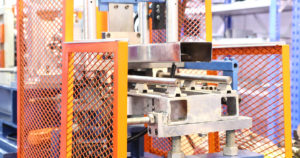Proper Safeguarding of Equipment Essential in Preventing Workplace Injuries
March 19, 2021 Many workers spend much of their day operating or using equipment and machinery. Hazardous mechanical actions, such as cutting, shearing, pinching, and stamping continually put workers at risk for serious injury. Unfortunately, many workplace accidents occur each year from improper or inadequate machine guards.
Many workers spend much of their day operating or using equipment and machinery. Hazardous mechanical actions, such as cutting, shearing, pinching, and stamping continually put workers at risk for serious injury. Unfortunately, many workplace accidents occur each year from improper or inadequate machine guards.
What are Machine Guards Designed to Do?
Machine guards are designed to create a barrier or otherwise protect workers and the dangerous and hazardous areas of a machine. The following three areas of machinery are most likely to cause injury and therefore require proper and effective safeguarding:
- The point of operation. This is where the work happens, including cutting, shearing, and pinching.
- Power transmission. Conveyor belts, flywheels, pulleys, chains and sprockets, cams, spindles, cranks, and gears are examples of power transmission apparatus that transmit energy to the point of operation.
- Feed mechanisms and other auxiliary parts. Other moving parts of the machine that rotate or traverse also require safeguarding.
The motions that machine guards are designed to protect against include rotating, traversing, and reciprocating. According to the Rochester Institute of Technology, machine guards should meet the following minimum requirements:
- Prevent contact. The most important requirement is to prevent workers’ hands, arms, or other body parts from coming in contact with areas of machinery most likely to cause injury.
- Create no new hazards. The guard itself should have no jagged edges or other features that may injure a worker who comes in contact with the guard.
- Protect from falling objects. The machine guard should make it impossible for debris to fall into moving parts of the machinery.
- Create no interference. Machine guards should not make it more difficult for workers to do their jobs.
- Allow for lubrication. Machine guards should not inhibit the process of lubricating moving parts.
Machine guards should also be tamper-proof and constructed in such a way as to prevent workers from removing the guard. They should be made of durable material that can withstand the conditions of the operating environment and be firmly secured to the machine. All types of machine guards are designed to safeguard moving parts of a machine. However, some types are more effective than others.
What are the Four Different Types of Machine Guards?
According to the Occupational Safety and Health Administration (OSHA), the four types of machine guards in use today are fixed, interlocked, adjustable, and self-adjusting. The advantages and limitations of these different types include the following:
Fixed guards. Fixed guards act as a secure barrier to moving parts to protect workers from injury. A fixed guard may be constructed of wire, screen, sheet metal, durable plastic, or bars. Because they are a permanent part of the machine, dismantling a fixed guard may require making subsequent repairs.
Interlocked guards. Interlocked guards are designed to prevent workers from reaching into moving parts of a machine unless it is completely stopped. Interlocked guards must be secured back in place before workers can restart the machine. One advantage of interlocked guards is that workers can reach into machines safely to remove jams without having to dismantle the guard. Interlock guards are considered passive safety device as they automatically cut power off to a machine once the guard is raised, lifted up or removed.
Adjustable guards. This type of guard is more convenient because it can be adjusted to accommodate different sizes and types of stock that are fed into the machine. However, adjustable guards do not provide maximum protection from injury because operators may be able to override them and reach into dangerous parts of the machine when it is unsafe to do so.
Self-adjusting guards. These guards provide a barrier that moves according to the size of the stock entering the dangerous area of the machine. They are typically inexpensive, off-the-shelf items that provide less than maximum protection against injury.
OSHA guidelines require employers to provide one or more methods of machine guarding to protect employees in the machine area. Barrier-type machine guards should be affixed to the machine when possible. For maximum protection, employers can also install other types of safety devices, including two-hand tripping devices and industrial safety mats that are placed on the floor around hazardous machines. Safety mats are pressure-sensitive and therefore capable of detecting the presence of workers approaching dangerous areas. Despite OSHA regulations and the availability of effective machine guarding solutions, workers may still be exposed to hazardous conditions that have not been engineered out or properly addressed by the machine manufacturer.
What Happens When Adequate Machine Guards are Not Installed?
When adequate machine guards are not installed, workers face high risks of serious injury. Over the years, Galfand Berger LLP has handled thousands of cases in which employees were seriously hurt by machinery that was found to be defective or unsafe due to lack of adequate machine guards.
Philadelphia Workers’ Compensation Lawyers at Galfand Berger LLP Provide Qualified Legal Representation to Workers Injured by Machinery
If you or someone you know suffered a workplace injury, reach out to the Philadelphia Workers’ Compensation lawyers at Galfand Berger LLP. We have been assisting injured workers in Pennsylvania and New Jersey for decades. To schedule a free consultation, call us today at 800-222-8792 or contact us online. From our offices in Philadelphia, Bethlehem, Lancaster, and Reading, Pennsylvania, we proudly serve clients throughout Pennsylvania and New Jersey, including Allentown and Harrisburg.
 Google Screened
Google Screened
